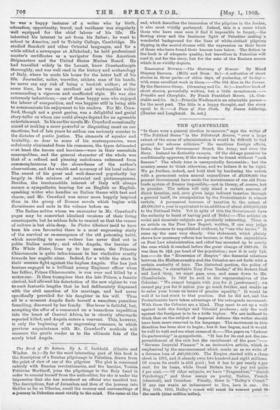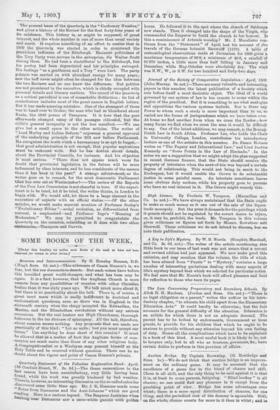THE QUARTERLIES.
"Ir there were a general election to-morrow," sap; the writer of "The Political Scene" in the Edinburgh Review, "over a largo extent of the scene of administration it would bo difficult to find ground for adverse criticism." He mentions foreign affairs, India, the Local Government Board, the Army, and even the Navy. Ireland he distinctly excepts. Of the old-age pensions he conditionally approves, if the money can be found without "rash finance." The whole tone is unexpectedly favourable ; but the country seems to think otherwise, and we believe it to be right. We go further, indeed, and hold that by burdening the nation with a permanent extra annual expenditure of 429,000,000 the present Government have made the maintenance of our old Freer trade system of finance impossible,—not in theery, of course, but in practice. The nation will only stand a certain amount of direct taxation, and, once given largo indirect taxation through a general tariff, its manipulation by the Protectionists is alniost certain. A permanent increase of taxation to the extent of 49,000,000 a year is equivalent to an addition of about 4100,000,000 to the National Debt. Yet in spite of this the Government have the audacity to boast of having paid off Debt i—The articles on social and economic subjects are peculiarly interesting. There is an article on the Poor Law Report, written, if one may judge from references to unpublished evidence, by "one who knows." It sums up the case very clearly. One statement, which plainly shows bow necessary reform has become, is that the expenditure on Poor Law administration and relief has mounted up to nearly the sum which it reached before the great change of 1833-34. It was then 8s. 2id. per head of the population ; now it is only 71d. less.—In the "Economics of Empire" the financial relations. between the Mother-country and the Colonies are set forth with a. certain austerity of tone. The historical portion, the policy of Huskisson, "a remarkable Tory Free Trader," of Sir Robert Peel, and Lord Grey, we must pass over, and come down to Mr. Chamberlain. In 1902 he said to the representatives of the Colonies: "We cannot bargain with you for it [preference] : we cannot pay you for it unless you go much further, and enable us to enter your house on terms of greater equality." It would be well if he had stuck to that position. But he did not, and the. Protectionists have taken advantage of his retrograde movement. With them the Colonies are a blind. They want to set up a walli against both the foreign and Colonial producer ; only the wall against the foreigner is to be a trifle higher. We are inclined to. think that on the subject of Imperial defence the writer should have been more reserved in his language. The movement in this direction has been slow to begin ; but it has begun, and it would be well to wait and see what comes of it.—The paper on "Labour Co-partnership" is sympathetic. "It has for its end not the im- poverishment of the rich but the enrichment of the poor."— " German Imperial Finance" is an instructive article, which is emphasised by the announcement which meets us as we write of a German loan of 4240,000,000. The Empire started with a clean sheet in 1876, and it already owes two hundred and eight millions. Of course its credit is still good ; but it has to pay nearly 4 per cent, for its loans, while Great Britain has to pay not gait° - 3 per cent.—Of other subjects, we have "Pragmatism," "Social. Psychology," and throe essays on poetry, Italian, French (classical), and Canadian. Finally, there is "Halley's Comet." If any one wants an indueement to live, here is one. On May 10th, 1910, Halley's comet will reaoh its nearest point te the earth (nine million miles). The present issue of the Quarterly is tho " Contenary Numbor," and gives a history of the Review for the first forty-four years of its existence. This history is, as might be supposed, of groat interest, and the whole number is one of more than usual variety and merit. It requires something of an effort to realise that in 1809 the Quarterly was started in order to counteract the pernicious influence of the Edinburgh. Eminent politicians of the Tory Party were movers in the enterprise, Sir Walter Scott among them. Ilo had been a contributor to the Edinburgh, but his poetry had been depreciated and his principles outraged. His feelings "as a gentleman and a Tory" wore hurt. The party polemic was carried on with abundant energy for many years ; now the buff cover might often be changed for the blue between the two Reviews and no one know the difference. But politics are not prominent in the narrative, which is chiefly occupied with personal details and literary matters. The record of the Quarterly as a critical periodical is one of remarkable distinction : its list of contributors includes most of the great names in English letters. But it has made amazing mistakes. One of the strangest of those was to band over to Croker, the man who had so blundered about Keats, the 1832 poenis of Tennyson. It is true that tho poet afterwards changed many of tho passages ridiculed, but the critic's general incapacity is not the loss manifest.—Wo can give but a small space to the other articles. The writer of "Lord Morley and Indian Reform" expresses a genoral approval cif the underlying principle of the Bill now before Parliament. He recognises the truth which a bureaucracy is so apt to forgot,— that good administration is not enough, that popular aspirations must be reckoned with. But he has doubts about details, about the Provincial Councils, for instance. And his objection Is most serious. "There does not appear much room for doubt that provincial legislation in the future will be more influenced by class interests, and ho loss considerate of the masses than it has been in the past." A strange aohieveMont, as the writer goes on to remark, for the most democratic Parliament that has ever sat at Westminster!—The review of the Reports of the Poor Law Commission is not cheerful in tone. If the experi- ment is to be tried, lot it be tried, the writer thinks, in London to begin with. We would add, let there be a large element in the -executive of experts with an official status.—Of the other articles, we would make especial mention of Professor Sorley's "Evolutionary Ethics "—social evolution, as differentiated from natural, is emphasised—and Professor logo's "Meaning of Modernism." We may be permitted to congratulate tho Quarterly on the occasion, coinciding as it does with two other .0entenaries,—Tennyson and Darwin.











































 Previous page
Previous page